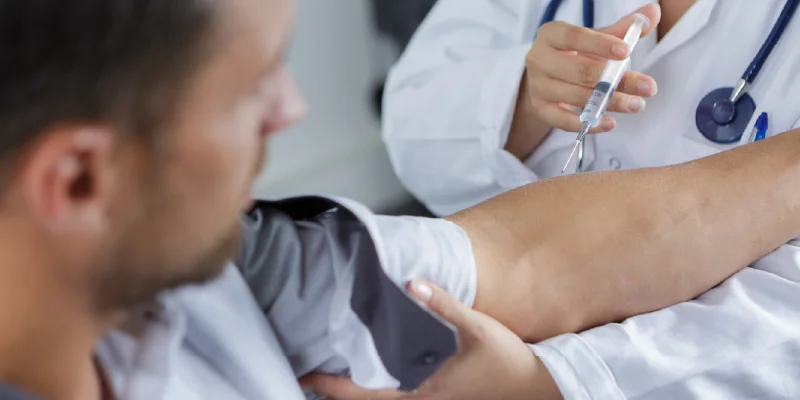Typhoid Vaccine: Benefits And Who Should Take?
Typhoid fever is a bacterial infection caused by Salmonella typhi. It spreads through contaminated food and water, leading to symptoms like high fever, abdominal pain, headache, and diarrhoea. Fortunately, an effective preventive measure is available in the form of the typhoid vaccine. In this article, we will explore the benefits of the typhoid vaccine and discuss who should consider getting vaccinated.
The Challenges of Typhoid Fever
Typhoid fever can affect anyone, but certain individuals are at a higher risk. People living in areas with poor sanitation, travelers visiting typhoid-endemic regions, and individuals working in close contact with carriers of the bacteria are particularly vulnerable. The disease can cause severe complications if left untreated and can even be fatal in some cases.
Benefits of the Typhoid Vaccine
- Prevention of Typhoid Fever: The primary benefit of the typhoid vaccine is its ability to prevent typhoid fever. By stimulating the immune system to develop an immune response against the bacteria that cause typhoid, the vaccine helps protect individuals from contracting this potentially life-threatening illness.
- Long-lasting Protection: The typhoid vaccine provides long-lasting protection against the disease. Depending on the type of vaccine administered, protection can last for several years or even a lifetime. This makes it an effective tool in preventing outbreaks and reducing the burden of typhoid fever.
- Reduced Transmission: Immunization not only protects individuals who receive the vaccine but also helps reduce transmission within communities. By decreasing the number of people carrying and spreading the bacteria, vaccination plays a vital role in controlling typhoid outbreaks.
Who Should Consider Getting Vaccinated?
- Travelers to Endemic Regions: If you are planning to travel to regions where typhoid fever is prevalent, especially developing countries with inadequate sanitation systems, you should consider getting vaccinated. Consult a healthcare professional at least two weeks before your trip for personalized advice.
- Healthcare Workers: Professionals who work in healthcare settings and may come into contact with typhoid carriers should strongly consider vaccination to protect themselves and their patients.
- Individuals in Close Contact with Carriers: If you live with or care for someone who has a known or suspected typhoid infection, vaccination is recommended to prevent transmission.
- Military Personnel: Military personnel deployed to areas with a high incidence of typhoid fever should receive the vaccine as part of their pre-deployment preparation.
- Individuals with Weakened Immune Systems: People with weakened immune systems, such as those undergoing chemotherapy, organ transplant recipients, or individuals living with HIV/AIDS, are more susceptible to infections. It is crucial for these individuals to receive the typhoid vaccine to safeguard their health.
- Laboratory Workers Handling Salmonella Typhi: Those involved in laboratory work that includes handling Salmonella Typhi should also consider receiving the vaccine. This precautionary step protects them from accidental exposure to the bacteria and helps prevent laboratory-associated infections.
FAQs
Q1. Is the typhoid vaccine safe?
A1. Yes, the typhoid vaccine is generally safe and well-tolerated. Common side effects include mild soreness at the injection site, low-grade fever, and muscle aches. Serious side effects are rare.
Q2. Can children be vaccinated against typhoid?
A2. Yes, there are specific vaccines available for children aged six months and older. The dosage and schedule may vary based on the child’s age and health status.
Q3. How long does the typhoid vaccine provide protection?
A3. The duration of protection varies depending on the type of vaccine administered. The injectable vaccine provides protection for about two years, while the oral vaccine offers protection for approximately five years.
The typhoid vaccine is a crucial tool in preventing the spread of typhoid fever, particularly in regions with inadequate sanitation facilities. By getting vaccinated, individuals can protect themselves from this potentially life-threatening disease and contribute to public health safety. If you are planning to travel to an endemic region or fall into any of the high-risk categories, consult your healthcare professional for guidance on receiving the typhoid vaccine.
Remember, prevention is always better than cure! Take charge of your health and stay protected!
To learn more about vaccinations and schedule a consultation, visit the Apollo Clinic website today!

